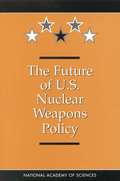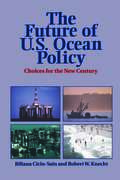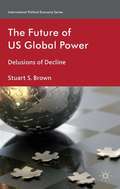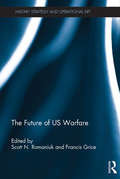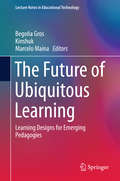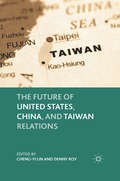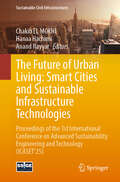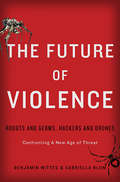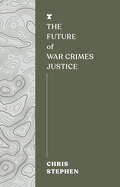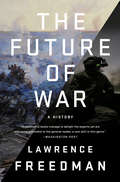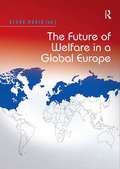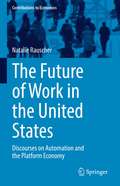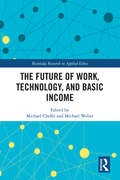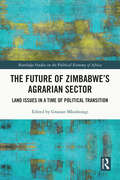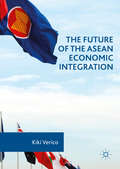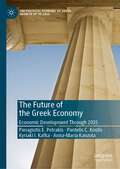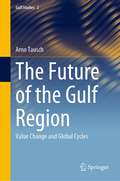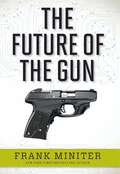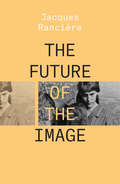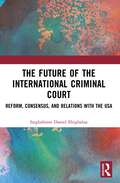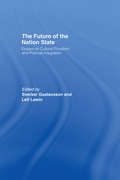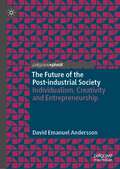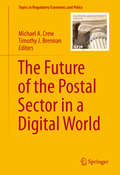- Table View
- List View
The Future of U.S. Nuclear Weapons Policy
by Committee on International Security Arms ControlThe debate about appropriate purposes and policies for U.S. nuclear weapons has been under way since the beginning of the nuclear age. With the end of the Cold War, the debate has entered a new phase, propelled by the post-Cold War transformations of the international political landscape. This volume--based on an exhaustive reexamination of issues addressed in The Future of the U.S.-Soviet Nuclear Relationship (NRC, 1991)--describes the state to which U.S. and Russian nuclear forces and policies have evolved since the Cold War ended. The book evaluates a regime of progressive constraints for future U.S. nuclear weapons policy that includes further reductions in nuclear forces, changes in nuclear operations to preserve deterrence but enhance operational safety, and measures to help prevent proliferation of nuclear weapons. In addition, it examines the conditions and means by which comprehensive nuclear disarmament could become feasible and desirable.
The Future of U.S. Ocean Policy: Choices For The New Century
by Robert Knecht Biliana Cicin-SainThe United States is about to embark on the most thorough reconsideration of its ocean policy in more than three decades. With 1998 designated as the International Year of the Ocean by the United Nations, and with both the executive branch and the Congress currently working toward developing new approaches to formulating and implementing ocean policy, a comprehensive overview of key issues and concerns is essential.The Future of U.S. Ocean Policy provides such an overview, with an in-depth analysis of the evolution of U.S. ocean policy and a timely discussion of the most important ocean and coastal issues facing the nation. The book assesses the current status of ocean policy, examines national and international trends, and considers choices for policymakers in the 21st century. Following an introductory chapter that reviews national ocean policy and the process by which it is made, the authors: review the history of development of U.S. ocean and coastal policy examine the major ocean laws enacted in the 1970s and review and assess their record of implementation examine factors that will affect U.S. ocean policy in the coming decade discuss the need to make policy more coherent, and to develop institutional mechanisms that can foster more effective guidance and oversight present a set of policy options for improving U.S. ocean policyThe Future of U.S. Ocean Policy is the only recent book that focuses on national ocean policy in its entirety, and will play an important role in upcoming debates concerning the future direction of policy initiatives. Agency personnel, members and staff of nongovernmental organizations, industry groups, Congressional staffers, state and local government officials, academics, and concerned citizens will find the book an invaluable guide, as will students and faculty in courses in marine and coastal management and in environmental management.
The Future of US Global Power
by Stuart S. BrownDispelling the myth of decline, Stuart Brown argues that the US continues to enjoy the economic, political, cultural and military underpinnings befitting a pre-eminent global power. He provides an analytical tour through the major domestic and foreign policy issues that will impact the United States' future position and role in the global system.
The Future of US Warfare (Military Strategy and Operational Art)
by Francis Grice Scott N. RomaniukThis book provides an interdisciplinary analysis of the future of US warfare, including its military practices and the domestic and global challenges it faces. The need to undertake a comprehensive analysis about the future of warfare for the US is more pressing today than ever before. New technologies and adversaries, both old and new, have the potential to revolutionize how wars are fought, and it is imperative that policy makers, military planners, and scholars engage with the latest analyses regarding these new threats and weapon systems. The primary aim of this book is to provide a clear and comprehensive depiction of the types of conflict that the United States is likely to become involved with in the future, as well as the methods of warfare that it may employ within these struggles. While a number of scholarly books have previously considered some of the potential features of US warfare in the future, many of these writings are either outdated or have limited their focus to just one or two of the main types of warfare that may occur and omitted consideration of the others. This book intends to remedy this deficiency in the literature. The volume consists of thematic chapters which address the key issues relevant to the future of US warfare, including cyber warfare, asymmetric conflicts, drone warfare, and nuclear strategy. Through the provision of a series of analyses by leading international academics, the volume provides an important interdisciplinary examination of the different areas of warfare that the United States is expected to use or encounter in the future. This book will be of great interest to students of US foreign policy, military studies, strategic studies and International Relations in general.
The Future of Ubiquitous Learning
by Kinshuk Begoña Gros Marcelo MainaThis book explores emerging pedagogical perspectives based on the design of new learning spaces supported by digital technologies and brings together some of the best research in this field. The book is divided into three themes: foundations of emerging pedagogies, learning designs for emerging pedagogies and, adaptive and personalized learning. The chapters provide up-to-date information about new pedagogical proposals, and examples for acquiring the requisite skills to both design and support learning opportunities that improve the potential of available technologies.
The Future of United States, China, and Taiwan Relations
by Denny Roy Cheng-Yi LinRelations across the Taiwan Strait were unstable for decades before May 2008. Several acknowledged "crises" raised the possibility of war between China and the US and/or Taiwan and at times political disputes wracked the US-Taiwan relationship. Nevertheless, the Taiwan Relations Act (TRA) of 1979 helped maintain peace by deterring coercive actions by China against the island.
The Future of Urban Living: Proceedings of the 1st International Conference on Advanced Sustainability Engineering and Technology (ICASET’25) (Sustainable Civil Infrastructures)
by Anand Nayyar Hanaa Hachimi Chakib El MokhiThis book provides a comprehensive manual for researchers, practitioners, policymakers as well as students striving to achieve environmental sustainment. It is exploring advanced developments in smart cities infrastructure and sustainability engineering. In addition, this book delivers advanced methodologies, emerging and innovative technologies that shape sustainable urban technologies. Including the renewable energy systems of tomorrow, to low-impact manufacturing procedures today; every section provides insight and real-world implementation. The book bridges the gap between theory and practice, making it an essential tool to turn sustainability challenges into opportunities. Salient characteristics comprise: 1. Global perspective: Allows for flexibility in solutions given a multitude of successful examples around the world from different cultural and geographic locations. 2. Multidisciplinary approach: Integrating perspectives from engineering, environmental science, economics and policy studies for holistic problem solving. 3. Financial sustainability: Innovative business models to make sustainable solutions good for the environment and even better economically. This provoking literature questions conventional wisdom and promotes adventurous visions of sustainability. By highlighting emerging trends in cloud computing, cybersecurity, and big data for urban development, readers are prepared to lead the next paradigm shift in sustainable innovation
The Future of Violence: Robots and Germs, Hackers and Drones-Confronting A New Age of Threat
by Benjamin Wittes Gabriella BlumThe ability to inflict pain and suffering on large groups of people is no longer limited to the nation-state. New technologies are putting enormous power into the hands of individuals across the world--a shift that, for all its sunny possibilities, entails enormous risk for all of us, and may even challenge the principles on which the modern nation state is founded. In short, if our national governments can no longer protect us from harm, they will lose their legitimacy. Detailing the challenges that states face in this new world, legal scholars Benjamin Wittes and Gabriella Blum controversially argue in [Title TK] that national governments must expand their security efforts to protect the lives and liberty of their citizens. Wittes and Blum show how advances in cybertechnology, biotechnology, and robotics mean that more people than ever before have access to technologies--from drones to computer networks and biological data--that could possibly be used to extort or attack states and private citizens. Security, too, is no longer only under governmental purview, as private companies or organizations control many of these technologies: internet service providers in the case of cyber terrorism and digital crime, or academic institutions and individual researchers and publishers in the case of potentially harmful biotechnologies. As Wittes and Blum show, these changes could undermine the social contract that binds citizens to their governments. In this brave new world of dispersed threats, Wittes and Blum persuasively argue that the best means for safeguarding our liberty and privacy are strong governmental surveillance and security networks. Indeed, they show--through engaging looks at political thinkers from Thomas Hobbes to the Founders and beyond--that security and liberty are mutually supportive, rather than existing in a precarious balance in which the increase in one leads to a proportional decrease in the other. And not only must we bolster our domestic security efforts, but we must think internationally. Our best defense is increasingly a transnational one: more multinational forces and greater action to protect (and protect against) the territory of weaker states who do not yet have the capability to police themselves. [Title TK] is at once an exposé of our emerging world--one in which students can print guns with 3-D printers and scientists’ manipulations of viruses can be recreated and unleashed by ordinary people--and an authoritative blueprint for how government and individuals must adapt to it.
The Future of War Crimes Justice
by Chris StephenFrom Russia to The Democratic Republic of Congo to Myanmar, Chris Stephen ponders the future of prosecuting war criminals who think themselves untouchable in this timely new book, part of Melville House FUTURES series.We are all too familiar with the horrors of war. Throughout history, rules have been laid down to govern the conduct of war, with varying success. Today, the International Criminal Court (ICC) in the Netherlands is the world's first permanent war crimes court, but since it opened in 2002, it has jailed just 4 people. So what has gone wrong?Journalist and ex war-correspondent Chris Stephen takes a look at the colorful history of how war law was devised, asking complicated and important questions such as: What constitutes a war crime? How and when can the law step into prosecute? Today, membership of the ICC is voluntary. Of the UN&’s 193 member states, 123 are in the ICC. But most of the world&’s war crimes are committed by the other 70. Simply put, governments that commit war crimes don&’t join the ICC – like Russia, for example.How then, do we go after war criminals? Follow the money, argues Stephen, and go after the banks and corporations that enable warlords. It worked for Al Capone, who, famously, was jailed not for his many killings, but for not paying his taxes. It was the same for Milosevic: years were spent gathering records, so judges could be shown he pulled the financial strings.Corporations and banks, span the world. Democracies and dictators both rely on them. The future of war crime courts demand they hit all the enablers, whether they wear battle fatigues or three-piece suits.
The Future of War: A History
by Lawrence FreedmanQuestions about the future of war are a regular feature of political debate, strategic analysis, and popular fiction. Where should we look for new dangers? What cunning plans might an aggressor have in mind? What are the best forms of defense? How might peace be preserved or conflict resolved?From the French rout at Sedan in 1870 to the relentless contemporary insurgencies in Iraq and Afghanistan, Lawrence Freedman, a world-renowned military thinker, reveals how most claims from the military futurists are wrong. But they remain influential nonetheless.Freedman shows how those who have imagined future war have often had an idealized notion of it as confined, brief, and decisive, and have regularly taken insufficient account of the possibility of long wars-hence the stubborn persistence of the idea of a knockout blow, whether through a dashing land offensive, nuclear first strike, or cyberattack. He also notes the lack of attention paid to civil wars until the West began to intervene in them during the 1990s, and how the boundaries between peace and war, between the military, the civilian, and the criminal are becoming increasingly blurred.Freedman's account of a century and a half of warfare and the (often misconceived) thinking that precedes war is a challenge to hawks and doves alike, and puts current strategic thinking into a bracing historical perspective.
The Future of Welfare in a Global Europe
by Bernd MarinWhat is the future of welfare in Europe? The European welfare state is generally considered to be one of the finest achievements of the post-1945 world. Set up to eradicate poverty by providing a minimum standard of living and social safety net, the welfare state has come under increasing strain from ageing societies, growing unemployment, a deskilling society, and mass migration (both from inside and outside of Europe). With contribution from some of Europe's leading experts on this subject, this path-breaking volume highlights the internal and external pressures on the welfare state and asks whether any European welfare model is sustainable in the long term. This book will be of interest to all students, academics and professions working in the field of European social policy.
The Future of Work in the United States: Discourses on Automation and the Platform Economy (Contributions to Economics)
by Natalie RauscherThis book presents and analyzes how restructuring processes due to technological change are reflected and processed in political and public discourses in the United States in the most recent past. More specifically, this work examines how the themes of automation, digitization, and the platform economy and their impact on the future of work are reflected in public discourse through the analysis of journalistic articles, and political discourse through the analysis of congressional hearings. Public and political discourses, as well as economic narratives, shape our understanding of certain developments such as technological change, our behavior more generally, and societal support of said developments. Therefore, it is vital to investigate and analyze these discourses in order to show how technological change is perceived and evaluated today. This work draws from concepts and methods of several different disciplines, most notably using a combination of corpus-linguistic methods and exemplary textual analysis. This way, this work stands as truly interdisciplinary, with a unique approach to the quantitative and qualitative examination of discourses.
The Future of Work, Technology, and Basic Income (Routledge Research in Applied Ethics)
by Michael Weber Michael CholbiTechnological advances in computerization and robotics threaten to eliminate countless jobs from the labor market in the near future. These advances have reignited the debate about universal basic income. The essays in this collection offer unique and compelling perspectives on the ever-changing nature of work and the plausibility of a universal basic income to address the elimination of jobs from the workforce. The essays address a number of topics related to these issues, including the prospects of libertarian and anarchist justifications for a universal basic income, the positive impact of a basic income on intimate laborers such as sex workers and surrogates, the nature of "bad work" and who will do it if everyone receives a basic income, whether a universal basic income is objectionably paternalistic, and viable alternatives to a universal basic income. This book raises complex questions and avenues for future research about universal basic income and the future of work in our increasingly technological society. It will be of keen interest to graduate students and scholars in political philosophy, economics, political science, and public policy who are interested in these debates.
The Future of Zimbabwe’s Agrarian Sector: Land Issues in a Time of Political Transition (Routledge Studies on the Political Economy of Africa)
by Grasian MkodzongiThis volume reflects on the recent political developments in Zimbabwe and their current and future impact on the agrarian sector. Utilising new empirical data gathered across Zimbabwe, the contributors shed light on the liberalisation of agricultural policy after Mugabe. Chapters examine how the adoption of neo-liberal orthodoxy in agrarian policy making will affect the new agrarian structure, looking at issues such as productivity, the impact on vulnerable groups, changing land tenure arrangements, joint ventures and land grabbing. Providing a new way of conceptualising Zimbabwe’s agrarian futures, this book will be of interest to researchers, NGOs and policymakers interested in the politics of land and agriculture in Zimbabwe and southern Africa.
The Future of the ASEAN Economic Integration
by Kiki VericoVerico discusses the ASEAN economic integration from dual perspectives of time span (trade, investment and finance) and framework (bilateral, sub-regional, regional and regional plus). The work is a comprehensive study of the integration in the wake of the ASEAN Economic Community (AEC)'s inauguration in late 2015. Examining various economic agreement levels from the ASEAN Free Trade Area (AFTA), Bilateral Free Trade Agreement (BFTA) and the AEC to financial integration in ASEAN, Verico attempts to envisage the future of ASEAN in completing its regional economic integration from trade to investment and finance. Verico argues that, in the absence of a customs union, ASEAN must utilize the open-regionalism frameworks of the ASEAN Plus One, ASEAN Plus Three, Regional Comprehensive Economic Partnership and others in order to shift its economic integration level in this way.
The Future of the ASEAN Economic Integration
by Kiki VericoVerico discusses the ASEAN economic integration from dual perspectives of time span (trade, investment and finance) and framework (bilateral, sub-regional, regional and regional plus). The work is a comprehensive study of the integration in the wake of the ASEAN Economic Community (AEC)’s inauguration in late 2015. Examining various economic agreement levels from the ASEAN Free Trade Area (AFTA), Bilateral Free Trade Agreement (BFTA) and the AEC to financial integration in ASEAN, Verico attempts to envisage the future of ASEAN in completing its regional economic integration from trade to investment and finance. Verico argues that, in the absence of a customs union, ASEAN must utilize the open-regionalism frameworks of the ASEAN Plus One, ASEAN Plus Three, Regional Comprehensive Economic Partnership and others in order to shift its economic integration level in this way.
The Future of the Greek Economy: Economic Development Through 2035 (The Political Economy of Greek Growth up to 2030)
by Panagiotis E. Petrakis Pantelis C. Kostis Kyriaki I. Kafka Anna-Maria KanzolaThis book introduces the Political Economy of Alternative Economic Futures for the Greek economy up to 2035. The analysis is not restricted to the presentation of a series of forecasts but aims to develop a comprehensive framework for Greece’s future. The analysis covers five realms regarding alternative economic futures, which outline the political economy of Greece: sustainable development; sustainable governance; inclusive growth; evolution of human behaviors; and dynamic growth. A growth, an unsustainable growth, a transformation, and a falldown scenario are generated based on the severity of key-uncertainty factors' effects.
The Future of the Gulf Region: Value Change and Global Cycles (Gulf Studies #2)
by Arno TauschThis book studies values and attitudes in the Gulf region. In light of global power shifts, the threatening collapse of internal security in the West, and uncertainty about the current leadership vacuum in world society, this book explores a future leading role of the Gulf countries in such institutions as the G-20 and the OECD. Based on rigorous analysis of macro-level data and opinion surveys with relevance for the Gulf region, it analyzes the global macro-factors shaping the Gulf's future at a time of the global COVID-19 crisis and depression and rising global tensions. Starting with an empirical time series analysis of the long cycles of global politics and economics, it highlights the implications for the Gulf region. Offering a multivariate analysis of civil society values in the Gulf, the author analyzes value changes and attitudes on antisemitism, political Islam, internal security, democracy, and other issues of Arab politics. The partially optimistic conclusions of the study testify to the underestimated and incipient maturity of the Gulf’s civil society and strongly suggest that the Gulf's future is rather with the free societies of the West and not with a Neo-Ottoman Empire in whatever form."Exceptional in scope and right up-to-the-minute in coverage"Brian M Pollins, Associate, Professor Emeritus, The Ohio State University."An outstanding and topical book by an astute scholar of the MENA region"Professor Hussein Solomon, Academic Head of Department, Political Studies and Governance, University of the Free State, South Africa."The most comprehensive and insightful study on the subject to date"Manfred B. Steger, Professor of Sociology, University of Hawai'i at Manoa and Global Professorial Fellow, Western Sydney University.
The Future of the Gun
by Frank MiniterThe history of the American gun is intricately entwined with the history of America itself. Promising developments in gun technology could change not only America's future, but the future of the world. Unfortunately, the radical anti-gun lobby is standing between innovation and the American people. Bestselling author Frank Miniter details the amazing breakthroughs waiting to happen in gun technology that could make today's firearms exponentially safer and smarter-if the anti-gun lobby weren't halting progress in its tracks.In The Future of the Gun, you will learn:Why anti-gun groups often oppose gun safetyfeatures How guns-and gun education for young people-cut crime How federalism could save your gun rights New trends in gun technology that will make guns safer and more effectiveWhy most talk about "assault rifles" is bogus How military and civilian gun technology have always advanced in tandem-for the benefit of soldiers and private citizens What guns could look like in just a few yearsWant to know about the future of guns? There is no better place to start than here.ter, more powerful handguns at prices (when adjusted for inflation) the world has never seen.Taurus, a Brazilian gun maker, played with using 3D printers to make guns over a decade ago. A Texas manufacturer has now made Model 1911 pistols out of steel with 3D printers ... the genie is out of the bottle.
The Future of the Image
by Jacques RanciereLauded by major contemporary artists and philosophers, Jacques Rancière’s work returns politics to its central place in understanding art. In The Future of the Image,Jacques Rancière develops a fascinating new concept of the image incontemporary art, showing how art and politics have always beenintrinsically intertwined. Covering a range of art movements, filmmakers such as Godard and Bresson, andthinkers such as Foucault, Deleuze, Adorno, Barthes, Lyotard andGreenberg, Rancière shows that contemporary theorists of the image aresuffering from religious tendencies.He argues that there is a starkpolitical choice in art: it can either reinforce a radical democracy,or create a new reactionary mysticism. For Rancière there is never apure art: the aesthetic revolution must always embrace egalitarianideals.
The Future of the International Criminal Court: Reform, Consensus, and Relations with the USA
by Iseghohime Daniel EhighaluaThis book presents the argument that solution-driven policy and treaty changes, if faithfully implemented, will rekindle the relevance of the International Criminal Court (ICC) in combatting and prosecuting atrocity crimes. This work examines how the International Criminal Court could be re-envisioned to perform optimally, and why such reform is urgent. It also discusses the position of the USA towards the court and explores why it has been unable to transition from marginal engagement to full spectrum support by signing and ratifying the Rome Treaty 1998. The conceptual frameworks deployed range from how the US construes its ‘national interest’ to geo-political balancing and the present rudderless state of the rules order, in addition to the personal predilections of US Presidents and the Court’s dysfunctional state. The objective is to show that if the ICC does not engender reforms internally, it will not survive the fissiparous tendencies innate in the presently fractured rules order. The work argues that only foundational reforms around treaty amendments along with institutional realignment of roles and responsibilities of the Court’s principal officers will yet rescue it. The book will be of interest to researchers, academics and policy-makers working in the areas of International Criminal Law and International Relations.
The Future of the Nation-State: Essays on Cultural Pluralism and Political Integration (Routledge Advances in International Political Economy #No. 1)
by Sverker Gustavsson Leif LewinThe tension between culture, politics and economy has become one the dominant anxieties of modern society. On the one hand people endeavour to maintain and develop their cultural identity; on the other there are many forces for international integration. How to understand and explain this fundamental issue is illuminated in nine essays by eminent scholars.
The Future of the Occupation of the Palestinian Territories after Gaza: Scenarios, Stakeholders and ‘Solutions’
by Erwin Van VeenThis open access book outlines four scenarios for the future of Israeli occupation of the Palestinian Territories as a broad canvas on which the interests, roles and perspectives of the key stakeholders involved in occupation are subsequently painted. An indirect result of 58 years of Israeli occupation of the Palestinian Territories, the Hamas attack on Israel of 7 October 2023 and the ensuing Israeli military campaign have greatly worsened Palestinian security in the short term, and Israeli security in the long term. Durable prospects for achieving reconciliation and peace are now shrouded in uncertainty, as political forces and views on both sides are likely to polarize and radicalize even further. October 7 and its aftermath have also introduced new uncertainties about the future nature of Israeli annexation and the modalities as well as extent of Palestinian resistance. Old frames have lost much of their validity, such as the Oslo agreements or even the logic underpinning security cooperation between the Palestinian Authority and the Israeli military. The book aims to improve our understanding of the post-October 7 context of occupation and the initiatives required to end it in the future. Ultimately, the book&’s intention is to shake up complacent policies and debates about the occupation of the Palestinian Territories by providing a more realistic basis for both reflection and action. While short-form analysis (e.g. blogs, essays and briefs) of October 7 and the ensuing events have proliferated, there has been little to no comprehensive analysis of the significance of these events for the future of occupation. Using the method of scenario planning to develop an analytical baseline, the added value of this book is that it offers a multi-dimensional consideration of this question both through the range of stakeholders it covers and the variety of its authors with respect to their research focus and perspective.
The Future of the Post-industrial Society: Individualism, Creativity and Entrepreneurship (Palgrave Studies in Classical Liberalism)
by David Emanuel AnderssonThis book studies the ongoing transition from an industrial to a creative (or post-industrial) society and how the creative society depends on a ‘soft infrastructure’ of individualist values and institutions. It explains this by looking first at the key actors in the creative society: creative individuals and entrepreneurial individuals, using insights from social and cognitive psychology and the economic theory of entrepreneurship. It shows how individual creativity and entrepreneurship are supported by both cultural individualism, based on the work of political scientists Ronald Inglehart and Christian Welzel, as well as political individualism, the principles of a democratic market economy guided by classical liberalism. The book offers a number of policy implications that result from the connection of this multidisciplinary reconceptualization of individualism to economic creativity. It discusses a system of property rights that accommodates the creation of new property, ranging from the result of what we normally think of as product innovation to larger-scale innovations embodied in the formation of new lifestyle communities. It also considers examples such as universities that are more open to experimentation and more autonomous from government regulation, and a more liberal immigration policy that may result from the positive association between population diversity and creativity. This book is intended to support further interdisciplinary and multidisciplinary research on the creative society (also known as post-industrialism, the postmodern society or the knowledge-based society). It will be of interest to academics and postgraduate students working in political economy, entrepreneurship, institutional economics, Austrian economics, and public policy.
The Future of the Postal Sector in a Digital World
by Michael A. Crew Timothy J. BrennanWorldwide, postal operators have been slow to address the threats from and opportunities created by electronic competition. The European Commission and member states are wrestling with these issues, while at the same time continuing to deal with the interrelated issues of implementing entry into postal markets and maintaining the universal service obligation. The Postal Accountability and Enhancement Act of 2006 in the U. S. exacerbated financial and managerial problems faced by USPS that result in part from electronic substitution for letter delivery. A major aim of this book is to examine policies to address postal operations in a digital world and ways in which postal operators might reinvent themselves to respond to threats and exploit opportunities. Potential opportunities examined include parcels, e-commerce, digital delivery, regulatory innovations and pricing. This book will be of interest to postal operators, regulatory commissions, consulting firms, competitors and customers, experts in the postal economics, law, and business, and those charged with the responsibility for designing and implementing postal sector policies. Researchers in regulatory economics, transportation technology and industrial organization will also find considerable food for thought in this volume.
